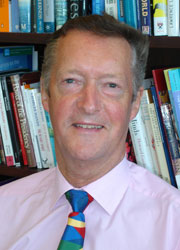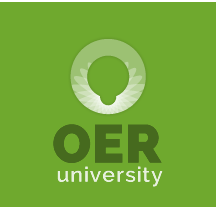Imagine anyone in the world having access to a world-class education online for free, and getting credentials for it. With the launch of Open Educational Resources University (OERu) on November 1, that’s exactly what is now possible. The launch is a significant milestone in higher education globally, and marks a transition from an international collaboration prototype to a sustainable, scalable program of accessible OERu study.

The official launch takes place at Thompson Rivers University in Kamloops, B.C. for face-to-face participants and streamed live for registered virtual participants. The launch comes at the end of a two-day meeting of OERu anchor partners and will be hosted by Dr. Alan Shaver, President, Thompson Rivers University. Sir John Daniel, Chair of United World Colleges (UWC) will give the keynote address and officially ‘push the button’ to launch the OERu website.
“The OERu launch is an important milestone in the long campaign to make quality higher education more flexible and less expensive,” said Sir John Daniel. “Getting it established will be a slow process because the concept is so radical. However, coming at a moment when higher education is in crisis because of rising costs and high youth unemployment, the OERu provides solutions to a host of challenges. In the end its logic will prevail, but expect a long haul.”
Problem / Solution
The current problem is that learners who access digital OERs on the web and acquire knowledge and skills either formally or informally cannot readily have their learning assessed for appropriate academic recognition. The solution is to create a parallel learning universe based solely on OER and built on a foundation of quality assurance and institutional accreditation. The OERu concept is supported by like-minded institutions committed to creating pathways for OER learners to gain academic credit through the formal education system. It’s an open network and philanthropic partnership including post-secondary institutions, non-profits, government, and international agencies. BCcampus is an anchor partner in OERu.
OERu is distinctly different

“The purpose of OERu is to widen access to education opportunities to all students worldwide with pathways to credible credentials especially those who are excluded from the formal education sector,” said Wayne Mackintosh, Director of OER Foundation and the UNESCO-COL Chair in OER at Otago Polytechnic in Dunedin, New Zealand. “It is our core differentiator and one of the main reasons our partners join our network.”
Beyond education, OERu embraces open everything – open philanthropy, open and transparent planning, open processes and practices, open licensing, open policy and open source software. With an Internet connection and an interest in learning, anyone can take courses at OERu. Courses are developed by recognized universities, polytechnics and community colleges and designed for formal academic credit. When students are ready, they have the option to obtain academic credit for courses from one of the anchor partner institutions.
“I’ve been involved in open and distance learning for twenty-five years and the OERu collaboration has been the most rewarding of my career. I’m excited about the launch,” said Mackintosh.
Initially OERu will offer two credentials – one undergraduate and one post-graduate and they are currently experimenting with micro Open Online Courses – mOOCs. Over time, the number of credentials will be expanded as well as the range of courses.
‘Smart Philanthropy’
As a philanthropic collaboration that aims to widen educational opportunity, OERu works through the agendas of social inclusion of its partners. Community service is central to what OERu is about. “We are a philanthropic organization, but it’s ‘smart philanthropy’ in that the lessons learned from our members through being part of this network can be ploughed back into the mainstream delivery on their own campuses,” said Mackintosh.
Towards an OER future

Mackintosh says the mission of OERu is to integrate OER and open education practices in every mainstream institution on the planet. This, he acknowledges, will take time, and points to leveraging OER as the key driver of its success.
“I’m a 40-year veteran of ODL [online and distance learning] who has spent his career trying to improve access to quality education at low cost,” said Sir John Daniel “I’m delighted that OERu is taking this formal step now.”
Research from the Commonwealth of Learning and UNESCO predicts that an additional one hundred million post-secondary learners will be entering into the tertiary education system over the next fifteen years. “The key challenge we are trying to address is how to provide spaces for the additional one hundred million students – that’s the equivalent of building four sizeable universities with roughly 30,000 students each, every week for the next 15 years,” said Mackintosh.
A seismic shift in thinking
How will OERu change the conversation about post-secondary education? “We are shifting the question from how do you achieve sustainable OER projects at your institution to, how will your institution remain sustainable without OER,” said Mackintosh. “We are the competition on the doorsteps of tertiary education institutions around the world.”
Follow-up
We will be following the evolution of OERu closely, and we’ve published a follow-up already. As well, Wayne Mackintosh has an excellent post-launch post on the WikiEducator.
Learn More
Notable Quotes
“Coming at a moment when higher education is in crisis because of rising costs and high youth unemployment, the OERu provides solutions to a host of challenges. In the end its logic will prevail, but expect a long haul.” -Sir John Daniel.
“The purpose of OERu is to widen access to education opportunities to all students worldwide with pathways to credible credentials especially those who are excluded from the formal education sector. It is our core differentiator and one of the main reasons our partners join our network.” -Wayne Mackintosh
“The key challenge we are trying to address is how to provide spaces for the additional one hundred million students – that’s the equivalent of building four sizeable universities with roughly 30,000 students each, every week for the next 15 years.” -Wayne Mackintosh.
“We are shifting the question from how do you achieve sustainable OER projects at your institution to, how will your institution remain sustainable without OER? We are the competition on the doorsteps of tertiary education institutions around the world.” -Wayne Mackintosh
OERu concept image ‘A Stairway to Success’ by Jim Taylor, via WikiEducator, licensed under Creative Commons Attribution-Share Alike 3.0 Unported license.
Photo of John Daniel used with permission.
Photo of Wayne Mackintosh by David Porter, used under a Creative Commons license.
